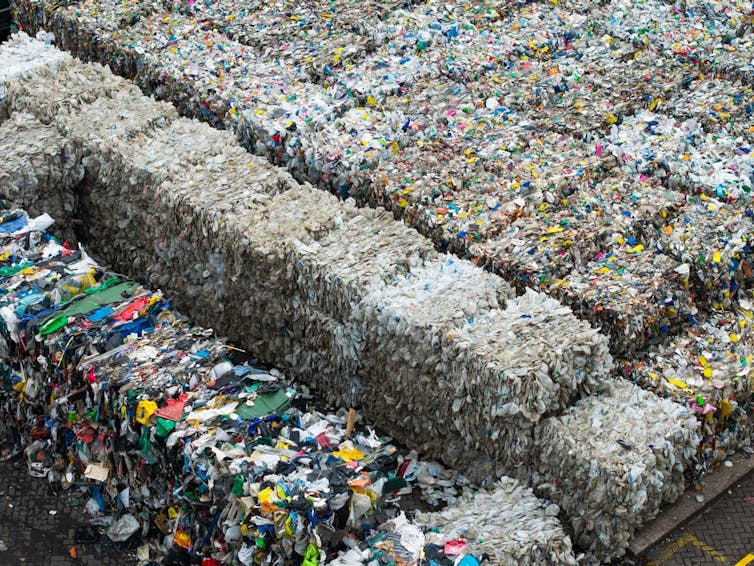Plastics and human health: what’s at stake in the global treaty talks in Geneva
Plastics are everywhere – they’re even in you right now – and are making many of us sick. Now, global negotiators are fighting over whether that matters.
As 180 countries meet in Geneva to seek agreement on a global treaty on plastic pollution, a landmark review published in medical journal The Lancet has made the stakes clear. Plastics, the evidence shows, are a threat to human health – from womb to grave.
They’re linked to miscarriages, birth defects, heart disease and cancer. Plastics are harming people at every stage of the plastics lifecycle – from initial oil extraction to the production and use of plastic products, and their eventual disposal via landfill, incinerator or just being left in the environment.
Yet the possibility of a strong, health-centred treaty hangs in the balance. Campaigners, scientists and healthcare groups are pushing for strong measures to cap production and ban hazardous chemicals. But petrochemical producers and industry lobbyists are pushing back – arguing, against mounting evidence, that plastics are essential to saving lives.
The UN meeting in Geneva is the culmination of several years of negotiating. In theory, delegates will agree on a global treaty by August 15.
The current draft text, which will be the basis for these negotiations, contains provisional elements which could make a real difference. These include cutting plastic production (Article 6), banning plastic products and chemicals that are hazardous to humans or the environment (Article 3), and a section dedicated to protecting human health (Article 19).
But some negotiators oppose these elements, and there is a risk they will be watered down or scrapped entirely in the final treaty.
The so-called Like-Minded Group of countries – many of whose members are petrochemical producers including Saudi Arabia, China, Iran, and Russia – has led the opposition to a health-centred treaty. They have done so by arguing that plastics are in fact essential for protecting health, due to the role of single-use plastic in modern medicine.
For example, Kuwait’s submission to the previous negotiating round in Busan, South Korea, last year called concerns about plastic “not inclusive”, and cited medical devices as proof that plastic saves lives. Saudi Arabia has opposed the inclusion of a dedicated article on health, arguing that this would divert the treaty away from its core purpose of managing plastic waste.
Since almost all plastic is made from oil or gas, these petrostates have a clear incentive to maintain the status quo of plastic production and dependency. No wonder they want to focus on managing waste, rather than making less in the first place.
Less than 10% of the world’s plastic is recycled.
Clare Louise Jackson / shutterstock
Plastics industry lobbyists have also been accused of “infiltrating” the negotiations and wielding outsized influence. They too have pushed the narrative that plastics are essential for human health – for example, with posters displayed in Busan which claimed “plastics save lives”.
These lobby groups are pushing for healthcare plastics to be exempted from the treaty entirely, which would provide a significant loophole for plastic producers.
As evidence grows of the ways plastics are harming humans, claims they are necessary to safeguard our health are looking increasingly far-fetched. Of course, plastics are everywhere in modern healthcare. But in most cases, and especially with single-use plastics, they can and should be replaced with a less harmful alternative.
Civil society groups, scientists and healthcare professionals are building momentum for a strong health-centred treaty. The international nongovernmental organization Health Care Without Harm has coordinated an open letter rejecting exemptions for the health sector. Signed by 65 organisations representing 48 million health workers across 88 countries, it calls for a treaty that tackles the full plastics lifecycle – and says cutting unnecessary plastic in healthcare is both possible and necessary to protect patients.
The Scientists’ Coalition, made up of independent experts, has been instrumental in bringing evidence of plastics’ health effects into the debate, while groups like the Global Alliance for Incinerator Alternatives have been pushing for the treaty to recognise that plastics, and especially their disposal, affect marginalised populations hardest. They argue that justice for the most affected people and places should be at the heart of the treaty.
The global plastics treaty is an unprecedented opportunity to take decisive, coordinated action to tackle one of the planet’s biggest threats. At stake in Geneva is whether health will stay at the heart of this treaty – or be sacrificed under pressure from industry and petrostates.
Cat Acheson receives funding from The Wellcome Trust for a project which partners with Health Care Without Harm.
Alice Street received a Wellcome Discovery Award for the project: ‘After the Single Use: Rethinking Medical Devices for Reuse, Resilience and Renewal’, which partners with Health Care Without Harm.
Rob Ralston is a member of Scientists’ Coalition for an Effective Treaty.


